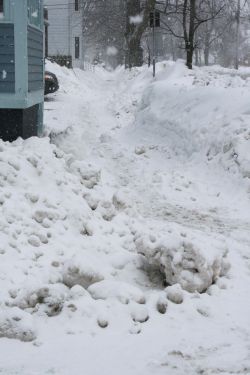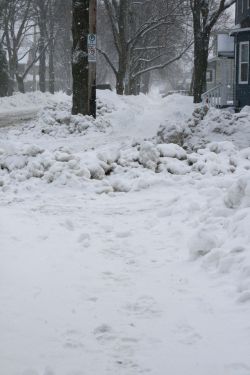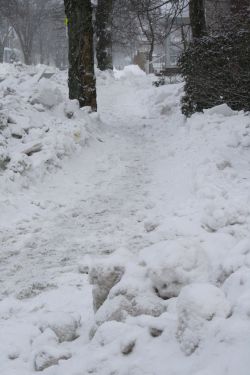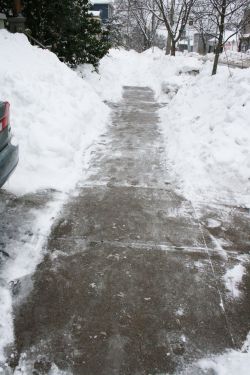Halifax Media Co-op
News from Nova Scotia's Grassroots
Sidewalk snow clearing: Three ideas
Haligonians have been talking (and cussing) up a storm (literal and figurative) these past few -- seemingly endless, weeks of blizzards -- about the state of our sidewalks.
A quick recap: in 2013 HRM Council extended municipal clearing of sidewalks to peninsular Halifax. Clearing of sidewalks in Dartmouth and Bedford had been taking place since time immemorial (or at least since prior to HRM amalgamation 20 years ago). In 2013 HRM council decided to implement a uniform policy across the municipality and sidewalk clearing began on peninsular Halifax (in districts 7, 8, & 9). A laudable idea.
Almost immediately problems surfaced. As Marilla Stephenson wrote in The Chronicle Herald on December 20, 2013:
"In Dartmouth, Bedford and the former county areas, the service is well established and contract obligations are apparently being met. But there was a blizzard of complaints over the past week in the former city, especially on the peninsula, due to poorly cleared sidewalks. Where shovels and snowblowers had ruled in the past, thanks to the diligent efforts of many citizens, contract equipment has taken over. Frankly, the sidewalks look like a housework version of a lick-and-a-promise; in other words, a job poorly done."
This year, particularly in recent weeks as snowfalls have mounted in intensity and frequency, many Haligonians have been vociferous in their criticism of the declining state of sidewalk snow clearance on the peninsula. So much so, that earlier this week HRM Councilor Waye Mason (Peninsula South) asked for a staff report to examine the implications of returning responsibility for sidewalk clearing to the residents in the peninsular districts of 7 and 8. According to MetroNews this motion was "vehementy opposed" by Councillor Linda Mosher (Peninsula West), who introduced the change in 2013 that brought sidewalk snow clearing to peninsular HRM.
In my view there is a strong case to be made for public (in this instance, municipal) participation in an issue such as sidewalk clearing. This is a common task/problem and we all benefit from a public role in assisting citizens to deal with what can be (depending on the weather and season) a very difficult task. It's hard enough for the able-bodied (like me) but for those who are elderly, suffer from disabilities, have children to care for, are not strong, or have limited economic means, dealing with snow clearing can be more than onerous.
As such, I heartily applauded the decision to extend public snow clearing to peninsular Halifax in 2013. I imagined that this public participation would to some degree alleviate and augment the individual, private clearing that people would do in front of their residences. In some cases, this has clearly been the result. But I've also been chagrined by the number of people who have seemingly abrogated all responsibility for the task now that the municipality has become involved.
I (and many others) have noted a significant decline in the quality of sidewalks during the past couple of years. The prior system of individual responsibility was also imperfect, there being some homeowners or landlords who did little or nothing to maintain the snow clearing on the sidewalks in front of their property (presumably leaving themselves open to fines). However, these tended to be one or two residences per block (or less) leaving the large number of residences with at least some degree of reasonable passage in front of the properties. This ratio has definitely taken a downward turn in the past two years.
Now, of course, any generalization has to be tempered by some consideration of the weather, and the past couple of years have seen some very harsh conditions (the latest endless series of snowfalls illustrating that). However, given what we know with respect to climate change, and particularly in regard to the winter weakening of the circumpolar vortex, such weather patterns are apt to continue (indeed, probably worsen) for the duration our lives -- and likely those of our children and grandchildren. We are going to be grapping with such unstable weather patterns for the foreseeable future.
Thus, I'm left pondering on how to square the circle of public and private responsibility with regard to snow clearing. In this context here are three suggestions that could help improve the situation.
1) Clearing Technology
There exist a great variety of technologies related to snow clearing, including various mechanical brush and broom systems that allow one to clear snow and ice down to close to the surface of the concrete sidewalks. Clearly the bobcat plows, front-end shovels, and salt and grit spreaders currently being employed would also continue to be needed, however, in combination with brush technology, perhaps this would allow for better results. If we're to do this in HRM, lets look at requiring contractors to use the best possible technology for the job. In general, taxpayers, are much more predisposed to seeing their money go toward measures if satisfactory results are being produced.
2) Heated Sidewalks
Reykavik, the capital of Iceland, has heated sidewalks that defrost/de-ice themselves! The city of Saskatoon is investigating installing such a system in selected areas of its Central Business District. Iceland, of course, has significant geothermal resources that are used to heat homes, the waste water from which (running at ~ 30ºC) is then channeled to sidewalk heating. Saskatoon (which, like Halifax, has no geothermal resources of the kind found in volcanic Iceland) is investigating using heat exchangers that would recapture waste energy (for example, from waste water).
Larry Hughes, a professor of engineering at Dalhousie University has pointed out that there are large quantities of waste heat (on the order of 810 Megawatts) being dumped into Halifax Harbour by the Tufts Cove generating plant. Even if 30 per cent of this heat were to be reclaimed it would be sufficient to heat 29,000 dwellings. If all of it were recoverable it could heat some 97,000 homes. This is a vast amount of available heat. Perhaps HRM city engineers could investigate the feasibility and costs of using some of that heat to defrost sidewalks in Halifax and Dartmouth?
In Iceland, not only does this approach save the costs of snow clearing, but it also extends the life of the sidewalks eliminating the physical wear and tear caused by plowing/clearing efforts. In the case of Halifax, it would also cut costs of the application of salt and grit, and then subsequent issue of the runoff of this material into the storm sewers (let alone, salt leaching into the ground and affecting trees and other vegetation).
3) Rewarding the Diligent
I would like to propose a 'carrot' with which to reward diligent property owners. Those who contribute to clearing the snow on sidewalks in front of their properties, thereby helping to make a combined public/private approach to this issue more feasible and effective. A reward to offer those who pursue the gold-standard of snow clearing on sidewalks in front of their property.
I would propose an annual competition in applicable districts of HRM to reward diligent snow-clearing property owners This could be organized and judged district-by-district by a "jury" of three or four residents who, over the course of the winter, would note people who had particularly well-cleared sidewalks and had put in additional elbow grease to augment public snow clearing. Winners (selected by the jury) would get a certificate and photo somewhere on an HRM website, however the real incentive would be a cash rebate from the city equivalent to their annual municipal property tax.
This would be a significant financial reward. It would, of course, have some cost for the city, essentially as revenue foregone from a limited number of properties. However, even if this was implemented in all 16 of HRM's polling districts at (say) a mean figure of $4,000 of municipal tax per property (a guesstimate on my part; HRM staff could readily determine a more exact amount), it would only amount to $64,000 in foregone revenue a year, a miniscule 0.006 per cent of the city's budget.
Would it be worth the investment? It could be tried for a year or two on a pilot basis in (say) peninsular Halifax (districts 7, 8, & 9) where there has been much public concern viz-a-viz the quality of sidewalk snow-clearing for a mere $12,000 (plus some administrative costs for staff time, etc.) to see if it generates significant participation, plaudits, and an improvement in the state of sidewalks.
Think these ideas have some merit? Have some other suggestions that you think might work? Contact your HRM councilor and let them know what you think could be done to help improve the system.
Those concerned with this issue may also be interested in my recent photo essay, Halifax Sidewalk Protest - A Photo Essay.
Comments
good ideas
All three of these suggestions make sense to me. The cost of retrofitting any significant amount of HRM's sidewalks would probably be prohibitive but Christopher Majka's suggestion of investigating the feasibility of doing this in some areas, using waste heat from Tuft's Cove, surely warrants investigation. (And while the civic engineers are at it, presumably they should also examine other productive outlets for the waste heat.)
I like Majka's use of a three-pronged approach but perhaps this could be supplemented with one or more additional strategies. In particular I would wonder if his district "juries" could also be used as a basis for organizing some of the actual shovelling. As Majka notes, some are more able than others to participate in such labour and perhaps the juries could connect willing volunteers in their districts with those most in need of assistance.
The site for the Halifax local of The Media Co-op has been archived and will no longer be updated. Please visit the main Media Co-op website to learn more about the organization.






